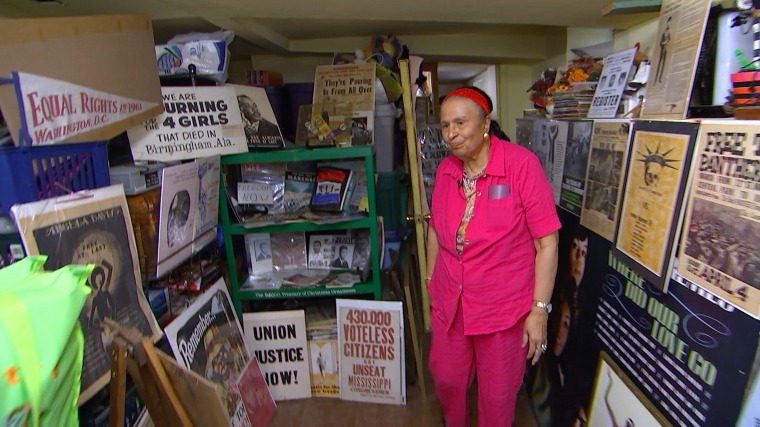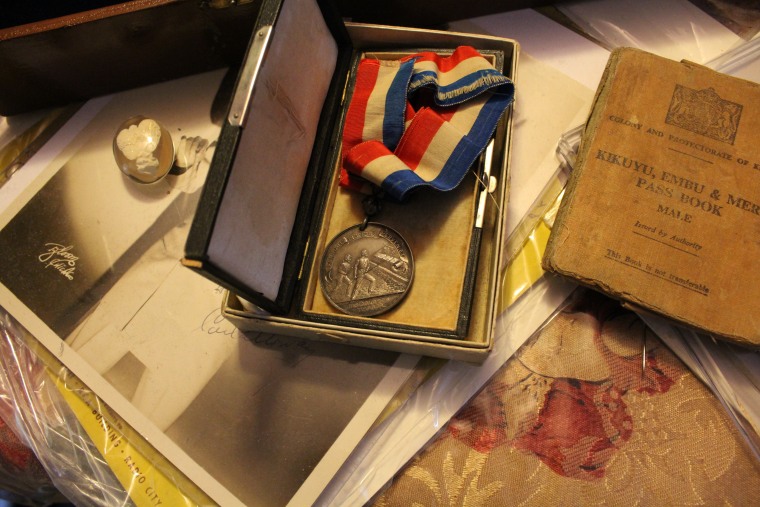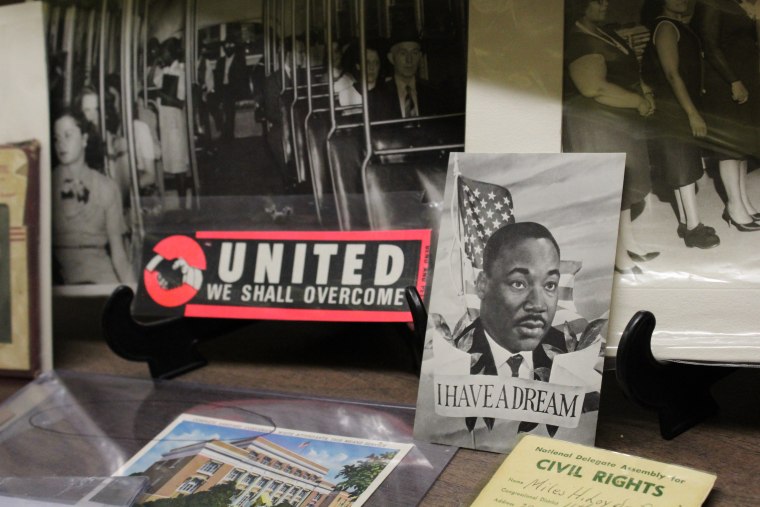Elizabeth Meaders admits she’s a bit “eccentric.”
It takes seeing the world a bit differently to live with some 50,000 pieces of historic African-American items and memorabilia — literally in every room — of her modest five-bedroom house in New York City. Walking the halls, browsing each room, the basement, garage, and closets is a journey through history, and an extraordinary learning experience.
Starting with her dining room table, Meaders highlights a medal honoring Crispus Attucks, the first American to die in the American Revolution, then letters written by Rosa Parks, Martin Luther King Jr., and several American presidents. There are heavyweight boxing championship belts from Muhammad Ali, Ken Norton, Mike Tyson and more. Shackles and restraints worn by slaves, battle gear worn by civil war soldiers, even a hood and burned cross representing the KKK.
“It shows what the challenge was for those who were trying to catapult all the hate,” the retired school teacher explained. “These are unique treasures from the African-American history trust. Each one of them a talking point and a documentation of important African-American history.”
Perhaps the most obvious question that comes to mind is, “why?” Why are these treasures in your home, and not on display in a museum?
"I come from a family where African-American history is very important," she explains noting that her family can trace its genealogy to the 1700s, and that her great-great grandfather was the last slave freed on Staten Island.
Related: From W.E.B. Du Bois to Octavia Butler: Your Spring Reading List
“I know the significance of this neglected history,” she went on to say, criticizing the nation’s schools for not teaching enough African-American history. “This has been a chore and a challenge I gave to myself and it has been a labor of love.”

As the tour continues Meaders points out flyers rallying passengers for the Montgomery bus boycott, Cab Calloway's baton, a crutch carried by a wounded civil war soldier etched with war cries: “We’re fighting for liberty...” There are slave branding irons, a picture of an African-American family at the St. Louis fair in 1902, Jackie Robinson’s American Legion hat, and much more.
Meaders claims she has been collecting items every day for the past 50 years, at memorabilia shows, from dealers, sitting in her rocking chair browsing catalogs, you name it. An appraiser who took a look estimated the value at $10 million.
“I’ve spent every penny I have, every penny I hope to have, every penny I ought to have,” Meaders proclaimed, adding that she’s refinanced her house a few times, and run up quite a bit of debt.

Her most prized possession is a civil war medal named for General Benjamin Butler, a white general who led a force of black soldiers into battle at a time when just about all of his colleagues refused to. Butler was said to have been so impressed with the soldiers, that he used his own money to buy extremely rare medals at Tiffany’s — only about 200 exist.
Why is it so precious to Meaders? “Because it’s the essence of who we are as a people," she explains, reflecting on the troops' bravery and valor. “Somebody has recognized it.”
But now, as the years have gone by, Meaders has come to realize it’s time to let go. She’s had offers to purchase parts of her collection. She has loaned items to museums. But she has refused to break-up what may be the most comprehensive collection of African American history assembled by a single person.
“It’s a journey through the African-American experience. That’s how it was developed and that is the purpose,” she said. “The impact is the word comprehensive.”
Finally, Meaders took a comfortable seat at her kitchen table. Arranged before her were very personal contents of a time capsule that had been inserted into a Boston building in 1890 by members of an African-American arts group that owned the building.
Related: Sacred Songs: Celebrating the Visionary Music of Alice Coltrane
“When the building was torn down these things went into an auction. I jumped at it,” she explained.
Inside the capsule were business cards identifying the owners, various documents and writings about their lives, and a small centuries-old black Bible.
Meaders put on her glasses, took a deep breath and began to read a message scrawled on the first page: “May the truth it contains last when this structure shall have crumbled to dust,” Meaders read, her voice cracking with emotion, her eyes filling with tears.
For her, that’s what her collection — her life’s work — is all about: the truth about the African-American experience.
"May this collection exist when Elizabeth Meaders has crumbled to dust," she whispered, hoping someone would hear.

